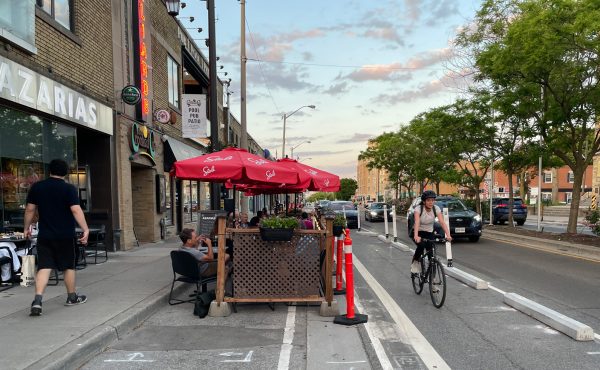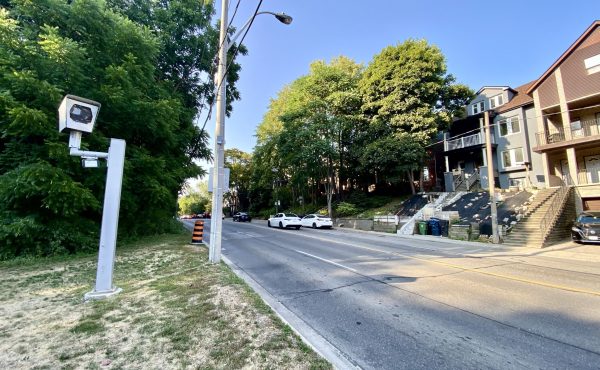
When some of Toronto’s most influential developers and the Board of Trade backed the watered down tax package that was adopted by City Council in October 2007, it signaled a shift in the right side of the stakeholder sphere that surrounds city hall. The aftershocks that ensued became apparent during deputations on the City’s operating budget last week.
While I predicted the most significant fallout would be between the real estate and development industries, that hasn’t been the case. Instead, the fault line that has emerged is the one between the Toronto Board of Trade and their former allies at the Canadian Federation of Independent Business and the Canadian Taxpayer Federation.
For many years these three amigos were singing from the same song book: the City should cut taxes by taking a “back to basics†approach to setting priorities and contract out as much work as possible to the private sector. This triple threat coddled the Lastman regime during its tax freeze years and has pumped resources into the unofficial opposition to the Miller administration through advertising campaigns, polling and phone and email blitzes.
Then, without warning, last Tuesday the BoT went solo as it told [PDF] the City’s Budget Committee to raise residential property taxes another 3 per cent. The Board called it a “surcharge†dedicated to addressing the troubled state of infrastructure in Toronto.
Councillors on the Budget Committee were stunned and Budget Chief Shelley Carroll shot down the proposal in the media immediately following the meeting. It became painfully obvious that the BoT’s proposal hadn’t even been out for a test drive on the second floor of city hall. This political fumble hung the BoT out to dry in the winds of rejection gusting from all sides of the political landscape.
I think what this almost impossible to explain 180-degree turn on BoT tax policy might be is signal of what’s to come from the blue ribbon Fiscal Review Panel that may report out before the end of this month.
The BoT is represented on the Panel by board member Paul Massara. With Massara getting a close up of the City’s books, I would guess that the BoT did a quick calculation and realized that the books aren’t as bad as they thought. If that’s the case, they probably figured it would be better being ahead of the curve by changing their public position on the City’s finances now instead of appearing reactive after the Panel’s report is released.
After the moment of truth that led them to realize that the City, in fact, has what is largely a revenue problem (as opposed to spending), the number of revenue options for the BoT to recommend was very limited. User fees wouldn’t provide enough revenue for the BoT wish list and everything but a residential property tax increase would have a financial impact on the Board’s members, which would be a political no-no for the BoT leadership.
But because of their ham fisted politicking, the BoT won’t be recognized as leaders in the revenue debate. Instead they’ll be maligned and mocked by their one-time allies and used by the Miller administration to ward off the “tax and spend†label.
Photograph courtesy Tokyololas.




9 comments
I think what killed the Board of Trade initiative was its blatant hypocrisy. Although they specifically said that the city’s terrible infrastructure was hurting business, they didn’t even propose that commercial property taxes be increased by the minimal one-third ratio currently used by the city in relation to the residential increase they were proposing.
If the city’s problems are hurting business, and they accept that the city needs more revenue, then surely an extra 1% hike in commercial property taxes (that would still have been a less than inflation increase for commercial taxes) is reasonable.
It’s one step, and a significant one, in the BoT’s civic education to realize that municipal government is necessary and that the current one is in fact relatively efficient, and needs more revenue to do its job.
But that education won’t be complete until the BoT accepts that business has to contribute its share to municipal programs that benefit business.
It’s not just business that has this problem, though. Even people who advocate for raising taxes generally say it should be someone else’s taxes that go up. The real breakthrough will come when we all finally admit that everyone, including ourselves, needs to pay more if municipal government is to do its job effectively.
It has been an interesting development with the BofT.
But instead of tax hikes on either business or the holemoaner, just thinking that maybe a lot of our costs come from automobility, and we should try to have a lot more cost recovery from them, though yes, there are definite costs to own and operate them as it is.
Dylan,
I would agree with you that the the cost of city building should be shouldered by both the residential and non residential sectors. The problem, and the rational behind the the BOT’s suggestion, is that residential taxes are starting from a much lower level. They can afford an increase while the commercial / industrial sector cannot. As attested to by Toronto’s abysmal job creation record compared to surrounding regions. The status quo already creates a situation where the classes are unequal financiers, with heavy favoritism towards residents.
Currently, taxation is so high on commercial properties that any increases simply get capitalized into assessment values and end up not producing added revenue. This is much like converting rental apartments to condos. The average assessment for a rental unit in Toronto is about $80,000. When converted into a condo its assessment approximately triples. The city collects a smaller percentage of a bigger assessment, but revenue is much closer than the percentages would predict. The opposite is what is occurring in the non residential class.
Even Royson James agreed that residential taxes are low in Toronto.
“Torontonians are over-burdened with property taxes? Compared with other Ontario cities, no. Compared with across North America, yes. What irks 905ers is that they pay much higher property taxes than neighbours in the 416 area code. In that sense, Toronto homeowners are not paying as much taxes as they could, leaving the door open for a hike. For Toronto businesses, however, the reality is the direct opposite.”
If you have a friend or relative in the GTA, ask what taxes they are paying for half the stuff we get.
i’m deeply skeptical about the claim that property taxes are “higher” in the suburbs. what is the basis for comparison? i would have thought it obvious why property taxes are lower for a tiny house on a tiny lot in high-density downtown than an acre or two in a low-density suburb with a single family living in it. i mean, suburbs are less dense than downtown, so each person owns more land to service and fewer landowners are around to pay for each piece of shared infrastructure. Furthermore, the suburbs have a way higher proportion of those wee little people who require expensive services but produce no revenue for the municipality at all (i.e., children).
There are large areas in the 905 that are indistinguishable from the areas in Toronto. Similar house sizes and similar lot sizes. If you are going to assume that city services scale with lot size please detail which ones. Keep in mind that funds for roads and services , water, drain and hydro-hook up plus roads, comes from up front development fees.
Furthermore, in the 905 user fees are higher and provincial grants are much lower. To the tune of $1058 per person.
mkm >
Not sure about any data about the suburbs having more children I would not know. But there has been countless comparison stories even in the Star that show that residential taxes are lower in Toronto (and I would add artificially low) and it is to me what the Front Street Extension is to Hamish. Somehow (partially to Mel Lastman and the Sun) many Toronto residents have lost sight of where their taxes compare and have this odd notion that they should be exempt from having them go up. I have family in London, Lindsay, Uxbridge, Whitby, Ajax, Hamilton and Grimsby….guess who has the lowest taxes by a mile? Me. You will have to take my word that we all have basic small middle class homes but in some cases the taxes are over 2000 dollars more ! Some of my older family are thinking of moving to Toronto because of more services for a cheaper price.
I agree that in theory density should reduce costs but density brings many problems with it that cost money and cities urban areas have always suffered by being the catchment areas for social problems that start in the less dense areas and head downtown looking for services.
I would also add that simpletons like Rob Ford have at least been clever in tying in rising taxes with competence so that every time there is some small issue or bungled thing at City Hall he can then say “see we don’t need to raise taxes” we just need to spend it better or less. The Board of Trade report certainly starts to chip away at the Sun/Ford logic and I am pretty confident that the panel reviewing how the money is spent will come back with a good review. The reality, reverse downloading, raise taxes, and have the courage to communicate the message clearly; something that Miller is absolutely outclassed by Ford on ( Ford represents that banality evil type concept but many people can relate to him but not the truth).
MKM, I think it’s simply a question of comparing the tax rates. If (to make the math easy) you bought a million-dollar house in Whitby, you’d pay $5,000 a year more in property taxes than if you bought a million-dollar house in Toronto. The difference will cover the new land transfer tax in just a few years.
Or, for the average homeowner: the average house in Durham Region, worth $280,000, gets a property tax bill just over $4,000; the average Toronto house is worth $369,300 and gets a tax bill of $3,150. One interesting comparison from those brochures: the average Durham house pays $131 in local transit subsidies, while in Toronto it’s $160. High ridership and shorter distances help the TTC stretch that subsidy much further.
If that million dollar property is a business, all of a sudden you’re paying $9,855 more in Toronto than in Whitby. That explains why the Board of Trade focused on residential taxes, though perhaps their presentation would have gone over better if they’d remained vague on exactly who should pay the surcharge.
I definitely agree that there’s an imbalance between too-high commercial and too-low residential taxes in Toronto. That’s why city council has adopted a policy of raising commercial taxes by only a third of the residential tax increase. That’s a pretty reasonable recognition of the problem, and I think it would have been reasonable for the BoT to follow this ratio in their recommendation if they have come to understand the importance of infrastructure to their businesses. Ignoring that already-reasonable ratio scuppered their initiative from the start. Which is a shame, because it was a good direction they were going in.